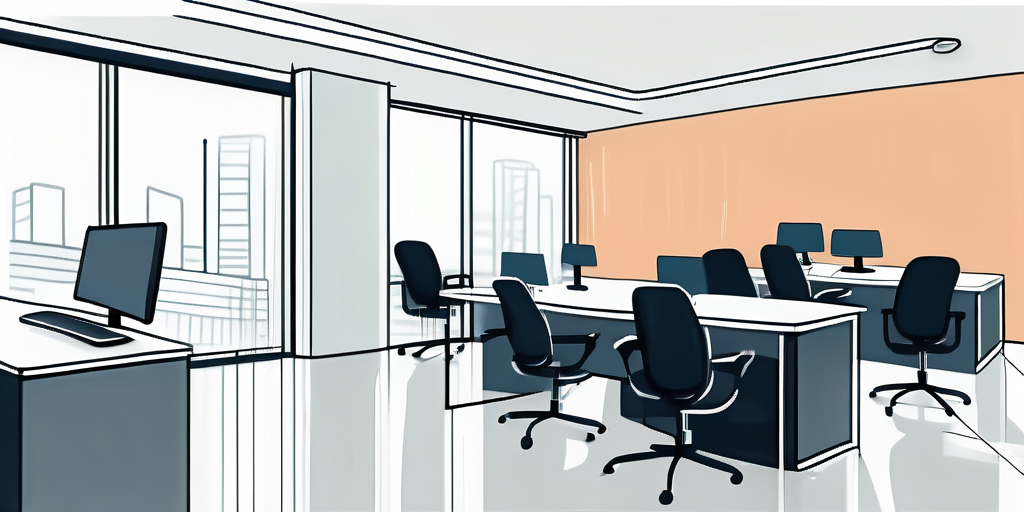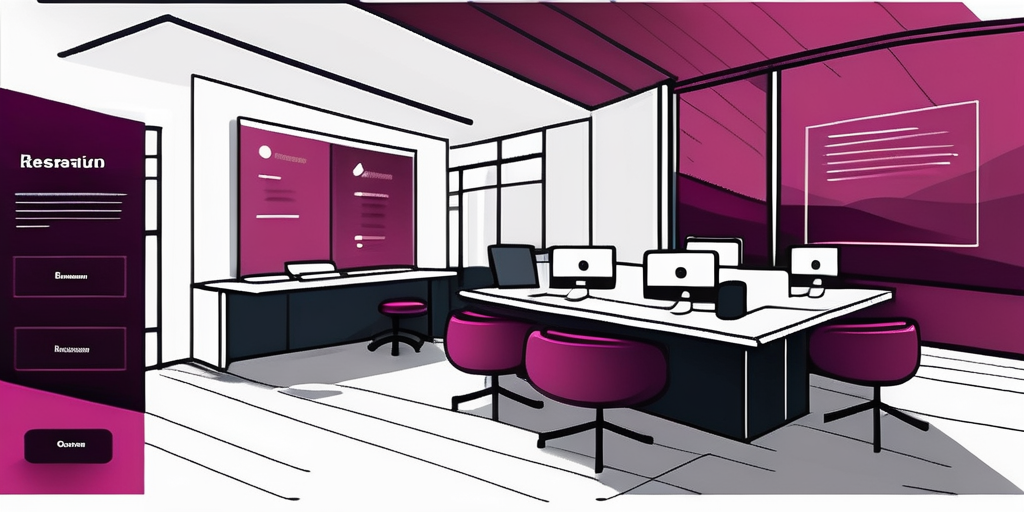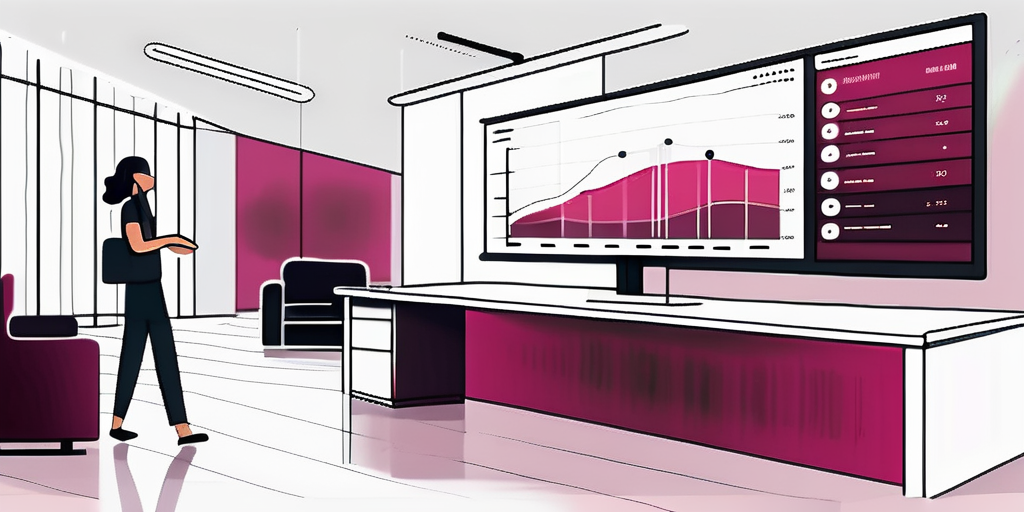In today’s fast-paced business world, optimising efficiency is essential for staying competitive. One area where businesses often overlook is their room and desk booking processes. By implementing an effective room and desk booking system, organisations can streamline their operations, reduce waste, and enhance employee satisfaction. In this article, we will explore the importance of efficient room and desk booking, key features of effective systems, strategies for implementation, overcoming common challenges, and measuring success.
Understanding the Importance of Efficient Room and Desk Booking
Efficient room and desk booking plays a pivotal role in improving productivity and minimising wasted resources. Let’s delve into how it impacts both these aspects:

The Impact of Room and Desk Booking on Productivity
When employees have easy access to available rooms and desks, they can quickly find suitable spaces to collaborate, work, or host meetings. This eliminates unnecessary waiting times, allowing teams to start their activities promptly. With efficient room and desk booking, employees can focus on their tasks instead of searching for empty spaces, resulting in increased productivity.
Reducing Wasted Resources
Poor room and desk booking practices can lead to underutilisation of valuable resources. If spaces remain unoccupied while others struggle to find seating, it results in wasted real estate and unnecessary expenses. By implementing an efficient system, businesses can maximise utilisation rates, effectively managing resources and reducing unnecessary costs.
Room and Desk Booking Enhance Employee Satisfaction
Booking the right room or desk in a convenient location can have a significant impact on employee morale and satisfaction. When employees can easily reserve spaces that align with their requirements, they feel supported and empowered. This improves employee engagement, collaboration, and overall job satisfaction, leading to a happier and more motivated workforce.
Moreover, efficient room and desk booking systems can also contribute to a more sustainable workplace. By optimising space usage and reducing the need for additional office expansions, companies can lower their carbon footprint and environmental impact. This aligns with the growing trend of businesses focusing on sustainability and corporate social responsibility.
Additionally, a well-organised booking system can provide valuable data insights for companies. By tracking room and desk utilisation patterns, businesses can identify peak usage times, popular meeting spaces, and areas that may require adjustments or improvements. This data-driven approach enables organisations to make informed decisions regarding office layouts, resource allocation, and future investments in workspace infrastructure.
Key Features of Effective Room and Desk Booking Systems
Now that we understand the importance of efficient room and desk booking, let’s explore the key features that effective systems should possess:

User-Friendly Interface
An intuitive and user-friendly interface is crucial for encouraging widespread adoption of the booking system. Employees should be able to navigate the platform effortlessly, making reservations with just a few clicks. A well-designed interface ensures a positive user experience, minimising training requirements and maximising system utilisation.
Moreover, a visually appealing interface with clear instructions and prompts can enhance user engagement and satisfaction. Customisable features, such as personalised booking preferences and notifications, can further improve the overall user experience. By prioritising user-friendliness, organisations can increase employee efficiency and streamline booking processes.
Real-Time Availability Updates
Accurate and real-time availability updates are essential to avoid double bookings or wasting time on occupied spaces. An effective system should provide instant updates on room and desk availability, allowing employees to make informed decisions. Real-time updates prevent disruptions and keep operations running smoothly.
Additionally, incorporating automated waitlist management can optimise resource utilisation by automatically assigning available spaces to waitlisted users. This proactive approach minimises downtime and maximises occupancy rates, ensuring efficient utilisation of office resources. By leveraging real-time data and predictive analytics, organisations can make data-driven decisions to improve booking efficiency.
Integration with Other Systems
A truly effective booking system seamlessly integrates with other business systems, such as calendar software, email clients, and collaboration tools. Integration ensures a cohesive workflow and eliminates the need for manual data entry. Streamlining processes across platforms saves time, reduces errors, and enhances productivity.
Furthermore, integration with facility management systems can provide valuable insights into space utilisation trends and occupancy patterns. By analysing this data, organisations can optimise office layouts, allocate resources more effectively, and identify opportunities for cost savings. Seamless integration with IoT devices, such as sensors for desk occupancy tracking, can enhance the accuracy of availability updates and streamline the booking process. Embracing a holistic approach to system integration can drive operational efficiency and enhance the overall workplace experience.
Strategies for Implementing Room and Desk Booking Systems
Implementing a room and desk booking system requires careful planning and execution. Here are some strategies to consider:
Identifying Your Organisation’s Needs
Before selecting a system, it’s crucial to assess your organisation’s requirements. Consider factors such as the number of employees, types of spaces needed, and any unique operational considerations. Understanding your needs will help you choose a system that aligns with your specific requirements.
Conducting surveys or interviews with key stakeholders can provide valuable insights into the current pain points and desired features. By involving various departments and employees in the needs assessment process, you can ensure that the chosen system caters to a wide range of preferences and requirements.
Training Staff on System Use
To maximise adoption and utilisation, proper training is indispensable. Ensure that employees receive comprehensive training on how to use the booking system effectively. Offer support resources and encourage ongoing learning to address any questions or challenges that may arise.
Consider creating user guides or video tutorials to supplement training sessions and serve as reference materials for employees. Providing multiple avenues for learning can accommodate different learning styles and preferences, increasing the likelihood of successful system adoption across the organisation.
Regularly Reviewing and Updating the System
To ensure that your room and desk booking system remains efficient and relevant, it’s essential to regularly review and update it. Collaborate with users to gather feedback and identify areas for improvement. Continuously enhancing the system will optimise its functionality and maintain high user satisfaction.
Establish a feedback mechanism, such as a dedicated email address or feedback form, to encourage users to share their experiences and suggestions for system enhancements. By fostering a culture of continuous improvement and user involvement, you can cultivate a sense of ownership among employees and drive ongoing system enhancements based on real-world usage scenarios.
Overcoming Common Challenges in Room and Desk Booking
Implementing a room and desk booking system is not without its challenges. Here are some common obstacles and strategies to overcome them:
When it comes to room and desk booking systems, one of the key challenges that organisations face is ensuring optimal utilisation of available spaces. To address this, consider conducting regular audits to analyse booking patterns and space usage. By understanding peak booking times and underutilised areas, you can optimise space allocation and improve overall efficiency.
Dealing with Overbooking
Overbooking can cause disruption and frustration for employees. To overcome this challenge, implement a system that includes automated checks to prevent double bookings. Additionally, establish clear policies and guidelines for cancelling or modifying reservations to ensure fairness and availability.
Another strategy to tackle overbooking is to implement a waitlist feature in your booking system. This allows employees to join a queue for fully booked rooms or desks, ensuring that spaces are utilised efficiently and reducing the likelihood of no-shows.
Managing No-Shows
No-shows can result in wasted resources and lost productivity. To manage this issue, consider implementing a notification system that sends reminders to employees before their scheduled booking. Encourage compliance and accountability through effective communication, emphasising the impact of no-shows on the entire organisation.
Addressing Technical Issues
Technical issues can hinder the effectiveness of any system. Ensure that you have competent IT support available to promptly address any technical challenges that may arise. Regularly test and maintain your system to minimise downtime and provide a seamless user experience.
Furthermore, consider investing in user training to empower employees to troubleshoot common technical issues independently. By providing resources such as FAQs, video tutorials, and help guides, you can enhance user confidence and reduce the burden on IT support teams.
Measuring the Success of Your Room and Desk Booking System
Measuring the success of your room and desk booking system is crucial for ongoing improvement. Here are some strategies to gauge its effectiveness:

Key Performance Indicators
Identify and track key performance indicators (KPIs) that align with your organisation’s goals. KPIs could include utilisation rates, average booking lead time, or employee satisfaction scores. Analysing these metrics will provide valuable insights into the system’s impact on efficiency.
Feedback from Users
Gather feedback from system users to understand their experiences and identify areas for improvement. Conduct surveys, focus groups, or one-on-one interviews to collect valuable insights. Actively listening to users’ suggestions and concerns reinforces their engagement and fosters a culture of continuous improvement.
Continual Improvement Strategies
Continually seek opportunities to enhance your room and desk booking system. Stay updated with industry best practices and technological advancements. Leverage user feedback and monitor emerging trends to ensure that your system remains at the forefront of efficiency.
But how do you know if your room and desk booking system is truly making a difference? One way to measure success is by examining the impact on employee productivity. Are employees able to easily find and book available rooms or desks, saving them valuable time and reducing frustration? By monitoring the average booking lead time, you can determine if the system is streamlining the process and improving efficiency.
Another aspect to consider is the reduction in wasted space. Are rooms and desks being utilised to their full potential? Utilisation rates can provide valuable insights into whether the system is effectively managing resources and maximising space utilisation. By tracking these rates over time, you can identify trends and make informed decisions about optimising your office layout.
Additionally, employee satisfaction is a key indicator of the system’s success. Are employees happy with the ease of booking and the overall user experience? By regularly gathering feedback through surveys or interviews, you can identify pain points and make necessary improvements to enhance user satisfaction.
In conclusion, measuring the success of your room and desk booking system goes beyond just tracking metrics. It involves understanding the impact on productivity, space utilisation, and employee satisfaction. By continuously seeking opportunities for improvement and staying ahead of industry trends, you can ensure that your system remains efficient and effective in meeting the needs of your organisation.
Ready to elevate your organisation’s efficiency with a state-of-the-art room and desk booking system? TenAV is at the forefront of transforming office spaces with innovative technology and user-friendly solutions. From seamless video conferencing integrations to intuitive booking software, we offer a range of services to streamline your operations and enhance your workplace. Embrace the future of the hybrid workplace with our cutting-edge systems designed for both in-person and remote participants. Don’t let managing your office space be a chore; let TenAV provide you with the tools to make every meeting and collaboration opportunity effortless. Contact Us today to discover how we can tailor the perfect audio visual solution to fit your team, your space, and your budget.

